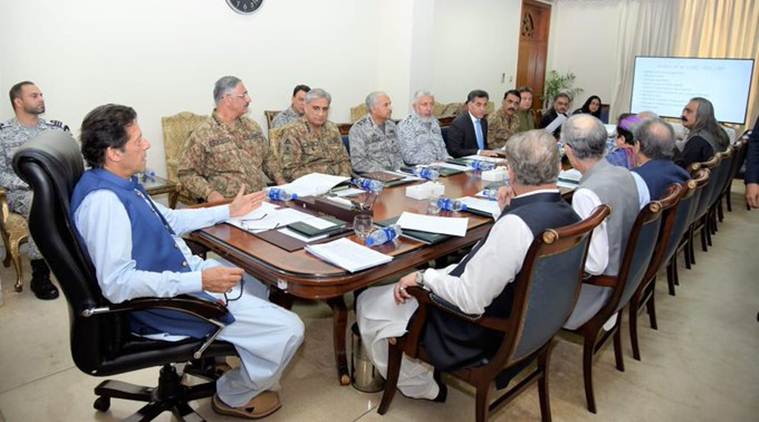
The Pakistan National Security Council (NSC), chaired by Prime Minister Imran Khan, Wednesday decided to downgrade diplomatic ties with India and suspend bilateral trade. The development comes a day after the Parliament adopted a resolution scrapping special status to J&K under Article 370 and passed a bill bifurcating the state into two Union territories — Jammu and Kashmir and Ladakh.
Simply put, High Commissioner Ajay Bisaria will be sent back to India. Pakistan says India has been informed to withdraw its High Commissioner to Pakistan. The government has also been informed that Pakistan will not be sending its High Commissioner-designate to India.
Just In: Pakistan says India has been told to withdraw its High Commissioner to Pakistan.
The Indian Government has also been informed that Pakistan will not be sending its High Commissioner-designate to India.
— Shubhajit Roy (@ShubhajitRoy) August 7, 2019
“We will call back our ambassador from Delhi and send back their envoy,” AFP quoted foreign minister Shah Mehmood Qureshi as saying.
The neighbouring country has also decided to approach the United Nations, including the Security Council, over India’s move on Kashmir.
Prime Minister Imran Khan chaired a meeting of NSC.
Prime Minister directed that all diplomatic channels be activated to expose the brutal Indian racist regime and human rights violations.
He directed Armed Forces to continue vigilance.#StandwithKashmir #Pakistan pic.twitter.com/3nqjcrwUQ3— Govt of Pakistan (@pid_gov) August 7, 2019
Besides the PM, Pakistan NSC comprises of Army chief Qamar Javed Bajwa, Foreign minister Shah Mahmood Qureshi among others.
Calling out Pakistan’s decision to downgrade diplomatic ties with India as “very short-sighted”, Congress leader and former external affairs minister Salman Khurshid said, “In these times it is important to maintain bilateral ties and the decision (of Pakistan) is very short-sighted and it is not going to make any difference to India.”
Khan on Tuesday voiced concerns that attacks similar to Pulwama could follow after the Centre’s move on Kashmir, which could trigger a conventional war between the two nations.
“This will be a war that no one will win and the implications will be global,” he said while addressing a joint sitting of Parliament in Islamabad to discuss Kashmir.
Meanwhile, Pakistan Army chief General Qamar Javed Bajwa had said his troops were prepared to “go to any extent” to help Kashmiris. Presiding over the Corps Commanders Conference on a single point agenda of Kashmir, he said: “Pakistan Army firmly stands by the Kashmiris in their just struggle to the very end. We are prepared and shall go to any extent to fulfil our obligations…”
Last evening, the Indian Army warned its Pakistani counterparts of a response that will be unaffordable for them in the wake of continued incidents of ceasefire violations and increased infiltration attempts from across the Line of Control in Jammu and Kashmir.
“During the past few days, Pakistan had intensified its efforts at increasing the strength of terrorists in launch pads along the Line of Control, initiating ceasefire violations, pushing infiltrators across the LoC, calibrating terrorist actions in the hinterland and also exploiting social media to launch disinformation campaign in Jammu and Kashmir,” said Northern Army Commander Lt General Ranbir Singh while chairing a meeting of the core group of intelligence and security agencies at Srinagar.
The Lok Sabha on Tuesday passed the Jammu and Kashmir Reorganisation Bill, 2019.